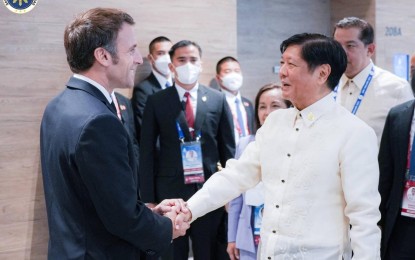
EXPANDED COOPERATION. President Ferdinand R. Marcos Jr. (right) and French President Emmanuel Macron meet on the sidelines of the 29th Asia-Pacific Economic Cooperation (APEC) Leaders’ Meeting in Bangkok, Thailand on Friday (Nov. 18, 2022). During their bilateral meeting, the two leaders agreed to further elevate the Philippines’ and France’s relations by expanding cooperation in key areas, such as agriculture, energy, and defense. (Photo courtesy of the Office of the President)
MANILA – President Ferdinand R. Marcos Jr. and French President Emmanuel Macron have renewed their intent to expand cooperation between the Philippines and France in the fields of agriculture, energy, and defense.
The plan to elevate the two nations’ ties was pitched when Marcos and Macron held a bilateral meeting on the sidelines of the 29th Asia-Pacific Economic Cooperation (APEC) Leaders’ Meeting in Bangkok, Thailand on Friday.
“I’m very confident that it will be a strong partnership," Marcos said after his bilateral meeting with Macron, as quoted by the Office of the Press Secretary in a news release on Saturday.
“So these are areas, the three basic areas that considered that partnerships could be explored,” he added.
Marcos said he wants to explore a partnership in the energy sector because of France’s “extensive” experience, citing that 67 percent of its power production is from nuclear energy.
He noted that he had a “very extensive and quite productive” meeting with Macron, as they discussed several regional issues, as well as “the worries that we have for the future.”
“He (Macron) was also kind enough to invite me to visit France when the time comes," Marcos said, adding that he reciprocated Macron’s invitation.
The inaugural in-person meeting between Marcos and Macron happened two months after the two had a phone conversation.
During a phone call in September, the two leaders agreed to further deepen the Philippines’ and France’s bilateral relations and cooperation in low-carbon energy, food security, and defense.
Diplomatic relations between France and the Philippines were first established in 1947 when both countries signed the Treaty of Amity in Paris.
After the historic state visit of former French president François Hollande to the Philippines in 2015, the two nations' relations became more centered on a commitment to ensuring a free and open Indo-Pacific area and upholding international law; pursuing joint action to fight climate change; and promoting cultural exchanges between their people.
Marcos and Macron both attended the 29th APEC Economic Leaders’ Meeting (AELM), with the French leader being invited as a guest at the informal dialogue with Asia-Pacific leaders.
Macron and Saudi Arabian Prime Minister and Crown Prince Mohammed bin Salman Al Saud were invited as guests to this year’s APEC summit.
The APEC economic leaders’ informal dialogue with guests and business leaders provides a platform for the promotion of sustainable trade and investment amid the economic challenges in the Asia-Pacific region.
During his intervention in the informal dialogue, Marcos raised several points on economic resilience, pandemic recovery, and digitalization, noting that “governments are responsible for providing their people with the necessary support for recovery, growth, and development.”
He emphasized the importance of having a “free, fair, and non-discriminatory” trade and investment environment, as well as “safety measures” that would help stabilize the flow of essential goods and services in times of crisis.
Marcos also sought to address regional trade and investment issues and identify opportunities of mutual interest with APEC partners and stakeholders. (PNA)
